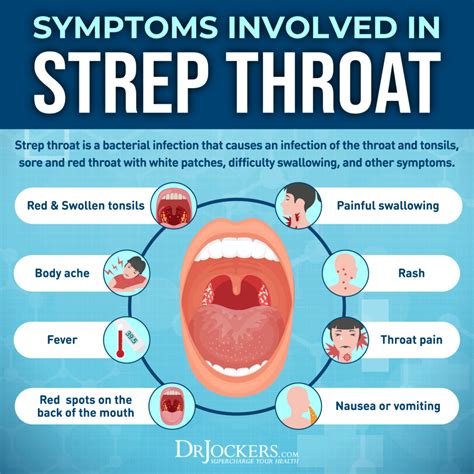Intro
Learn about Strep Throat In Kids, its symptoms, causes, and treatment options, including antibiotics, to help your child recover from this common childhood illness, also known as Streptococcal Pharyngitis.
Strep throat is a common and highly contagious bacterial infection that affects millions of children worldwide every year. It is caused by the Group A Streptococcus bacteria and is usually spread through close contact with someone who is already infected. The infection can cause a range of symptoms, including a sore throat, fever, and swollen lymph nodes. As a parent, it is essential to be aware of the signs and symptoms of strep throat in kids, as well as the best ways to prevent and treat the infection.
Strep throat can be a challenging condition to diagnose, as its symptoms are often similar to those of other illnesses, such as viral sore throats. However, if left untreated, strep throat can lead to more severe complications, such as kidney inflammation and rheumatic fever. Therefore, it is crucial to seek medical attention if you suspect that your child has strep throat. A healthcare professional can perform a physical examination and run tests to determine the cause of the infection and provide the necessary treatment.
The importance of recognizing and treating strep throat in kids cannot be overstated. Not only can it help to alleviate the symptoms and prevent complications, but it can also reduce the risk of transmission to others. Strep throat is highly contagious, and children can easily spread the infection to their friends, family members, and classmates. By taking prompt action and seeking medical attention, parents can help to protect their child's health and prevent the spread of the infection to others.
What is Strep Throat?

The symptoms of strep throat can vary from person to person, but they often include a sore throat, fever, and swollen lymph nodes. The infection can also cause other symptoms, such as a headache, stomachache, and loss of appetite. In some cases, strep throat can lead to more severe complications, such as kidney inflammation and rheumatic fever. These complications can be serious and even life-threatening, which is why it is essential to seek medical attention if you suspect that your child has strep throat.
Causes and Risk Factors
The causes and risk factors of strep throat are important to understand, as they can help to prevent the infection and reduce the risk of transmission. The Group A Streptococcus bacteria are the primary cause of strep throat, and they can be spread through close contact with someone who is already infected. The bacteria can also be spread through contaminated food and drinks, as well as through the air when an infected person coughs or sneezes.Certain risk factors can increase the likelihood of developing strep throat, such as age, exposure to the bacteria, and a weakened immune system. Children between the ages of 5 and 15 are at the highest risk of developing strep throat, as they are more likely to be exposed to the bacteria in school and other social settings. People with a weakened immune system, such as those with chronic illnesses or taking immunosuppressive medications, are also at a higher risk of developing strep throat.
Symptoms of Strep Throat in Kids

The symptoms of strep throat can be similar to those of other illnesses, such as viral sore throats. However, there are some key differences that can help to distinguish strep throat from other conditions. For example, strep throat often causes a severe sore throat, whereas viral sore throats tend to be milder. Strep throat can also cause a fever, which is often higher than 102°F (39°C).
Some common symptoms of strep throat in kids include:
- A severe sore throat
- Fever, which is often higher than 102°F (39°C)
- Swollen lymph nodes
- Headache
- Stomachache
- Loss of appetite
- White patches on the tonsils
- Red and swollen tonsils
Diagnosis and Treatment
Diagnosing strep throat can be challenging, as its symptoms are often similar to those of other illnesses. A healthcare professional can perform a physical examination and run tests to determine the cause of the infection and provide the necessary treatment. The most common test used to diagnose strep throat is a rapid strep test, which can detect the presence of the Group A Streptococcus bacteria in the throat.If the rapid strep test is positive, the healthcare professional will prescribe antibiotics to treat the infection. The most common antibiotics used to treat strep throat are penicillin and amoxicillin. It is essential to complete the full course of antibiotics, even if the symptoms improve before the medication is finished. This can help to prevent the spread of the infection to others and reduce the risk of complications.
Prevention and Complications

Some tips for preventing strep throat include:
- Practicing good hygiene, such as washing your hands frequently
- Avoiding close contact with someone who is already infected
- Getting plenty of rest
- Eating a healthy diet
- Staying hydrated
- Avoiding sharing food, drinks, or utensils with someone who is already infected
If left untreated, strep throat can lead to more severe complications, such as kidney inflammation and rheumatic fever. These complications can be serious and even life-threatening, which is why it is essential to seek medical attention if you suspect that your child has strep throat.
Home Remedies and Self-Care
There are several home remedies and self-care strategies that can help to alleviate the symptoms of strep throat. Some of these remedies include: * Staying hydrated by drinking plenty of fluids * Getting plenty of rest * Eating a healthy diet * Using a humidifier to add moisture to the air * Sucking on lozenges or cough drops to soothe the throat * Taking over-the-counter pain medications, such as acetaminophen or ibuprofenIt is essential to note that these remedies are not a substitute for medical treatment. If you suspect that your child has strep throat, it is crucial to seek medical attention to get a proper diagnosis and treatment.
Treatment Options

In addition to antibiotics, there are several home remedies that can help to alleviate the symptoms of strep throat. Some of these remedies include staying hydrated, getting plenty of rest, and eating a healthy diet. It is essential to note that these remedies are not a substitute for medical treatment, and it is crucial to seek medical attention if you suspect that your child has strep throat.
Some common treatment options for strep throat include:
- Antibiotics, such as penicillin and amoxicillin
- Home remedies, such as staying hydrated and getting plenty of rest
- Over-the-counter pain medications, such as acetaminophen or ibuprofen
- Throat sprays or lozenges to soothe the throat
Recovery and Follow-Up
Recovering from strep throat can take several days to a week, depending on the severity of the infection. It is essential to complete the full course of antibiotics, even if the symptoms improve before the medication is finished. This can help to prevent the spread of the infection to others and reduce the risk of complications.After completing the treatment, it is essential to follow up with your healthcare professional to ensure that the infection has been fully cleared. This can help to prevent the spread of the infection to others and reduce the risk of complications.
Some tips for recovering from strep throat include:
- Completing the full course of antibiotics
- Getting plenty of rest
- Staying hydrated
- Eating a healthy diet
- Avoiding close contact with others until the infection has been fully cleared
What are the symptoms of strep throat in kids?
+The symptoms of strep throat in kids can include a severe sore throat, fever, swollen lymph nodes, headache, stomachache, and loss of appetite.
How is strep throat diagnosed?
+Strep throat is diagnosed through a physical examination and a rapid strep test, which can detect the presence of the Group A Streptococcus bacteria in the throat.
What is the treatment for strep throat?
+The treatment for strep throat typically includes antibiotics, such as penicillin or amoxicillin, and home remedies, such as staying hydrated and getting plenty of rest.
Can strep throat be prevented?
+Yes, strep throat can be prevented by practicing good hygiene, avoiding close contact with someone who is already infected, and getting plenty of rest.
What are the complications of strep throat?
+The complications of strep throat can include kidney inflammation and rheumatic fever, which can be serious and even life-threatening if left untreated.
In conclusion, strep throat is a common and highly contagious bacterial infection that affects millions of children worldwide every year. It is essential to be aware of the signs and symptoms of strep throat, as well as the best ways to prevent and treat the infection. By seeking medical attention and completing the full course of antibiotics, parents can help to alleviate the symptoms of strep throat and reduce the risk of transmission to others. We encourage you to share this article with others, comment below with your thoughts, and take the necessary steps to protect your child's health.
